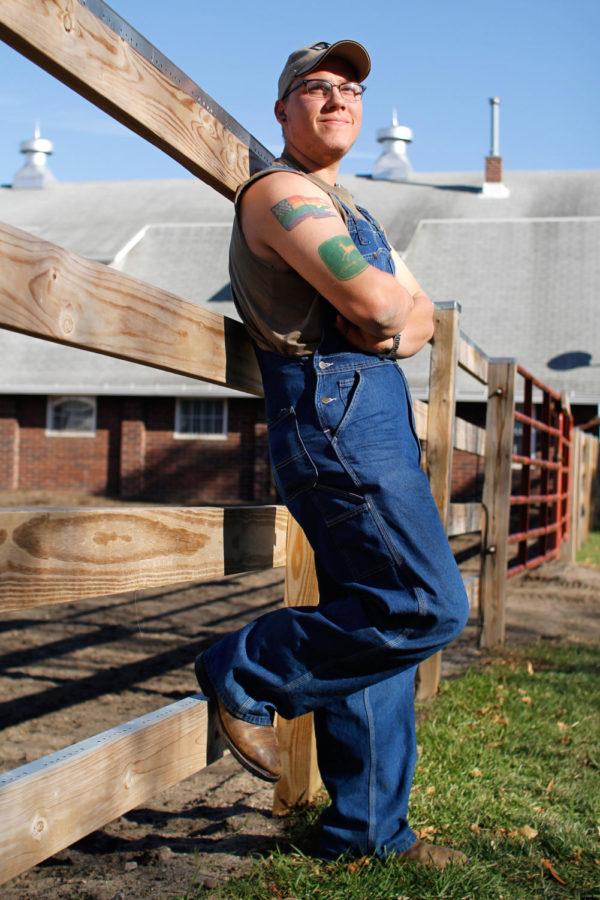LGBT community finds difficulty living openly in small town life
Photo Illustration: Miranda Cantrell/Iowa State Daily
Alex “Howdy” Paul is a freshman in animal science. Despite coming out as gay in high school in Colorado, Paul has hesitated about revealing his sexual orientation to employers in the farming industry due to fear of being fired.
December 13, 2013
When Alex “Howdy” Paul, a freshman in animal sciences, changed majors from agriculture engineering, he wondered whether he really wanted to be a farmer. A lot of people from small towns and rural areas are unfamiliar with people who identify as LGBT.
“Farming and being gay, it’s really hard to put those two things together,” Paul said.
Paul knew that being open about his sexuality would not be a good idea, but other students found out anyway.
Paul said the group of students who would invite him to join them for dinner and hang out just stopped talking to him. He has no hard feelings about the situation and said he doesn’t blame any of the guys in the major.
Steven Mickelson, a professor and the chair of the agricultural engineering department, said he encourages students who are having problems to talk with staff in the department.
Mickelson said his department aims to provide a safe, welcoming environment to all students. The department has recently been working with its External Advisory Board “to better communicate the importance of diversity both in the workplace and in our academic setting,” Mickelson said.
“In a lot of small towns, homosexuality used to be something of a taboo topic,” said Joel Geske, associate professor of journalism and communication.
Geske said there were no highly visible role models in the LGBT community through the 1980s, but now it is much more common to see role models and same-sex relationships in the media.
Geske organizes the Fourth Friday Family, a gathering and potluck that brings together LGBT people and allies from all across central Iowa, including small towns, farms and big cities. Geske said he hears people at the gatherings talk about feeling isolated.
“They feel different; they feel invisible; they feel like the ‘odd man out,’” Geske said. “If homosexuality was brought up, it was always negatively.”
Paul has worked in the farm industry in Iowa and Colorado. He lived on a farm in Colorado and drove semi trucks in Iowa, as well as working for his grandparents.
Paul came out during high school when he lived in Boulder, Colo. He said he went back in the closet after graduating because he was working in the farming industry.
“In Iowa, even, working for a farmer here driving semi trucks, it’s a very different group of people than you’d find in a college town and not as much ability to be open,” Paul said.
Iowa has had employment protection based on sexuality and gender preference since 2007, but Paul said he was positive he would be fired if his employers knew he was gay.
Having friends who supported him is what got Paul through farming in Colorado. At work, he would have to pretend to be straight and go along with his co-workers when they asked him if he had a girlfriend or made racial slurs.
“It’s when I have to start pretending or faking it, that’s the part that bothers me,” Paul said.
Paul said it is fun to watch as society continues to change, and he believes social media is a big part of the change. People who used to be isolated because of where they live have social media now and have brought LGBT issues that were never talked about before into the discussion, Paul said.
“It gets better. I know it’s so cliche to say, but it does,” Paul said.
Paul said maybe being out could give someone else from a rural background the courage to feel like they will be alright.
“I don’t expect to farm and have other farmers ever embrace it, but there’ll be a point where I’m sure I can be able to farm without worrying about it,” Paul said.







